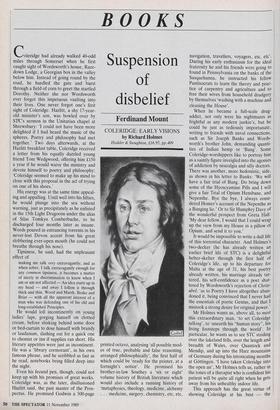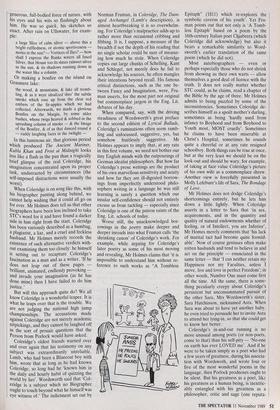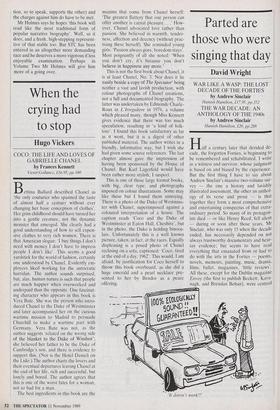BOOKS
Coleridge had already walked 40-odd miles through Somerset when he first caught sight of Wordsworth's house, Race- down Lodge, a Georgian box in the valley below him. Instead of going round by the road, he hurdled the gate and burst through a field of corn to greet the startled Dorothy. Neither she nor Wordsworth ever forgot this impetuous vaulting into their lives. One never forgot one's first sight of Coleridge. Hazlitt, a shy 17-year- old minister's son, was bowled over by STC's sermon in the Unitarian chapel at Shrewsbury: 'I could not have been more delighted if I had heard the music of the spheres. Poetry and philosophy had met together.' Two days afterwards, at the Hazlitt breakfast table, Coleridge received a letter from his equally dazzled young friend Tom Wedgwood, offering him £150 a year if he would waive the ministry and devote himself to poetry and philosophy: `Coleridge seemed to make up his mind to close with this proposal in the act of trying on one of his shoes.'
His, energy was at the same time appeal- ing and appalling. Until well into his fifties, he would plunge into the sea without warning, just as precipitately as he enlisted in the 15th Light Dragoons under the alias of Silas Tomkyn Comberbache, to be discharged four months later as insane. Words poured in entrancing torrents in his never-lost Devon accent from his great slobbering ever-open mouth (he could not breathe through his nose).
Tipsiness, he said, had the unpleasant effect of
making me talk very extravagantly; and as when sober, I talk extravagantly enough for any common tipsiness, it becomes a matter of nicety in discrimination to know when I am or am not affected — An idea starts up in my head — and away I follow it through thick and thin, Wood and Marsh, Brake and Briar — with all the apparent interest of a man who was defending one of his old and long-established Principles.
He would loll incontinently on young ladies' laps, gorging himself on clotted cream, before slinking behind some door or bed-curtain to dose himself with brandy or laudanum, dashing out for a quick one to chemist or inn if supplies ran short. His literary appetites were just as incontinent. He was a 'library cormorant', in his own famous phrase, and he scribbled as fast as he read, notebooks being filled deep into the night.
Even his fecund pen, though, could not keep up with his promises of great works. Coleridge was, as the later, disillusioned Hazlitt said, the past master of the Pros- pectus. He promised Godwin a 500-page
Suspension of disbelief
Ferdinand Mount
COLERIDGE: EARLY VISIONS by Richard Holmes
Hodder & Stoughton, £16.95, pp.409 printed octavo, analysing 'all possible mod- es of true, probable and false reasoning, arranged philosophically', the first half of which could be 'ready for the printer, at a fortnight's notice'. He promised his brother-in-law Southey a 'six or eight' volume history of British literature which would also include a running history of `metaphysics, theology, medicine, alchemy . . . medicine, surgery, chemistry, etc, etc, navigation, travellers, voyagers, etc, etc'. During his early enthusiasm for the ideal fraternity he and his friends were going to found in Pennsylvania on the banks of the Susquehanna, he instructed his fellow Pantisocrats to learn the theory and prac- tice of carpentry and agriculture and to free their wives from household drudgery by themselves 'washing with a machine and cleaning the House'.
When he became a full-scale drug- addict, not only were his nightmares as frightful as any modern junkie's, but he could be just as tediously importunate, writing to friends with naval connections, such as Sir Joseph Banks and Words- worth's brother John, demanding quanti- ties of Indian hemp or 'Bang'. Some Coleridge-worshippers like to portray him as a saintly figure inveigled into the agonies of addiction by neuralgia and silly doctors. There was another, more hedonistic, side, as shown in his letter to Banks: 'We will have a fair trial of Bang. Do bring down some of the Hyoscyamine Pills and I will give a fair Trial of Opium Hensbane, and Nepenthe. Bye the bye, I always consi- dered Homer's account of the Nepenthe as a Banging lie.' Or to Sir Humphry Davy of the wonderful prospect from Greta Hall: 'My dear fellow, I would that I could wrap up the view from my House in a pillow of Opium, and send it to you.'
It would be impossible to write a dull life of this torrential character. And Holmes's two-decker (he has already written an earlier brief life of STC) is a delightful helter-skelter through the first half of Coleridge's life, up to his departure for Malta at the age of 31, his best poetry already written, his marriage already tat- tered, his self-confidence as a poet shat- tered by Wordsworth's rejection of Christ- abel: 'as to Poetry I have altogether aban- doned it, being convinced that I never had the essentials of poetic Genius, and that I mistook a strong desire for original power.' Mr Holmes wants us, above all, to meet this extraordinary man, `to set Coleridge talking', to 'unearth his "human story", his living footsteps through the world'. In particular, he wants us to see STC striding over the lakeland fells, over the length and breadth of Wales, over Quantock and Mendip, and up into the Harz mountains of Germany during his intoxicating months at Gottingen. 'I have taken Coleridge into the open air', Mr Holmes tells us, rather in the tones of a therapist who is confident his patient will be quite all right when he gets away from his unhealthy indoor life.
This approach has the great virtue of showing Coleridge at his best — the ' generous, full-bodied force of nature, with his eyes and his wits so flashingly about him. He was so quick, his sketches so exact. After rain on Ullswater, for exam- ple: a large Slice of calm silver — above this a bright ruffledness, or atomic sportiveness motes in the sun? — Vortices of flies? — how shall I express the Banks waters all fused Silver, that How too its slates rainwet silver in the sun, & its shadows running down in the water like a column.
Or making a bonfire on the island on Grasmere lake:
the wood, & mountains, & lake all tremb- ling, & as it were idealized thro' the subtle smoke which rose up from the clear red embers of the fir-apples which we had collected. Afterwards, we made a glorious Bonfire on the Margin, by some alder bushes, whose twigs heaved & sobbed in the uprushing column of smoke — & the Image of the Bonfire, & of us that danced round it — ruddy laughing faces in the twilight
In this luminous air, that glorious period which produced The Ancient Mariner, Kubla Khan and Frost at Midnight looks less like a flash in the pan than a tragically brief glimpse of the real Coleridge, his Imagination concentrated upon its proper task, undistracted by circumstances (the self-imposed distractions were usually the Worst).
When Coleridge is on song like this, with his biographer panting along behind, we cannot help wishing that it could all go on for ever. Mr Holmes does tell us that other biographers have been less inclined to take STC's word for it and have found a darker side in him right from the start. Coleridge has been variously described as a humbug, a plagiarist, a liar, and a cruel and feckless husband. Mr Holmes merely records the existence of such alternative verdicts with- out examining them too closely: he himself Is setting out to recapture Coleridge's fascination as a man and as a writer. 'If he does not leap out of these pages brilliant, animated, endlessly provoking and invade your imagination (as he has done mine) then I have failed to do him Justice.'
But will this approach quite do? We all know Coleridge is a wonderful leaper. It is what he leaps over that is the trouble. We are not judging the national high jump championships. The accusations made against Coleridge are not merely academic nitpickings, and they cannot be laughed off as the sort of prosaic questions that the Person from Porlock would have asked.
Coleridge's oldest friends warned over and over again that his testimony on any subject was extraordinarily unreliable. Lamb, who had been a Bluecoat boy with him, wrote that as long as he had known Coleridge, so long had he 'known him in the daily and hourly habit of quizzing the world by lies'. Wordsworth said that 'Col- eridge is a subject which no Biographer ought to touch beyond what he himself•was eye witness of.' The indictment set out by Norman Fruman, in Coleridge, The Dam- aged Archangel (Lamb's description), is almost heartbreaking it is so overwhelm- ing. For Coleridge's malpractice adds up to rather more than occasional cribbing and fibbing. It is, I suppose, a measure of the breadth if not the depth of his reading that no single scholar could be sure of measur- ing how much he stole. When Coleridge copies out large chunks of Schelling, Kant and Schlegel, not merely does he fail to acknowledge his sources, he often mangles their intentions beyond recall. His famous critical distinctions, such as the one be- tween Fancy and Imagination, were, Fru- man asserts, for the most part not original but commonplace jargon in the Eng. Lit. debates of his day.
When compared, say, with the driving steadiness of Wordsworth's great preface to the second edition of Lyrical Ballads, Coleridge's ruminations often seem ramb- ling and unfocussed, suggestive, yes, but somehow fruitlessly suggestive. Mr Holmes appears to imply that, at any rate in this first volume, we need not bother our tiny English minds with the outpourings of German idealist philosophers. But how far Coleridge's prose writings are the product of his own marvellous sensitivity and acuity and how far they are ill-digested borrow- ings from imperfectly understood philo- sophers writing in a language he was still learning is surely a question which our insular self-confidence should not entirely excuse us from tackling — especially since Coleridge is one of the patron saints of the Eng. Lit. schools of today.
Worse still, the unacknowledged bor- rowings in the poetry make deeper and deeper inroads into what Fruman calls 'the shrinking canon' of Coleridge's work. For example, while arguing for Coleridge's later poetry as some of his most moving and revealing, Mr Holmes claims that 'it is impossible to understand him without re- ference to such works as "A Tombless Epitaph" (1811) which re-explores the symbolic caverns of his youth'. Yet Fru- man points out that not only is 'A Tomb- less Epitaph' based on a poem by the 16th-century Italian poet Ch,iabrera (which Coleridge did acknowledge) but also it bears a remarkable similarity to Word- sworth's earlier translation of the same poem (which he did not).
Most autobiographers — even or perhaps especially those who do not shrink from showing us their own warts — allow themselves a good deal of licence with the truth. It does not really matter whether STC could, as he claims, read a chapter of the Bible by the age of three. Mr Holmes admits to being puzzled by some of the inconsistencies. Sometimes Coleridge de- scribes himself as a spoilt mother's darling, sometimes as being 'hardly used from infancy to Boyhood and from Boyhood to Youth most, MOST cruelly'. Sometimes he claims to have been miserable at Christ's Hospital, sometimes he sounds quite a cheerful or at any rate resigned schoolboy. Both things can be true at once, but at the very least we should be on the look-out and should be wary, for example, of taking at face value Coleridge's picture of his own wife as a commonplace shrew. Another view is forcefully presented in Molly Lefebure's life of Sara, The Bondage of Love.
Mr Holmes does not dodge Coleridge's shortcomings entirely, but he lets him down a little lightly. When Coleridge asserts in a letter to Sara that 'in sex, acquirements, and in the quantity and quality of natural endowments whether of feeling, or of Intellect, you are inferior', Mr Homes merely comments that 'his lack of marital tact had become quite formid- able'. Now of course geniuses often make rotten husbands and tend to believe in and act on the principle — enunciated in the same letter — that 'I can neither retain my Happiness nor my Faculties, unless I move, live and love in perfect Freedom'; in other words, Number One must come first all the time. All the same, there is some- thing peculiarly creepy about Coleridge's persistent but unconsummated pursuit of the other Sara, Mrs Wordsworth's sister, Sara Hutchinson, nicknamed Asra. When Sara was about to have yet another baby, he even tried to persuade her to invite Asra to attend her lying-in, so that she could get to know her better.
Coleridge's in-and-out running is no more unusual among poets (or non-poets, come to that) than his self-pity — `No-one on earth has ever LOVED me'. And if he were to be taken simply as a poet who had a few years of greatness, during his associa- tion with Wordswoth, and wrote four or five of the most wonderful poems in the language, then Porlock prodnoses ought to be silent. But -his greatness as a poet, like his greatness as a human being, is inextric- ably entangled with his greatness as a philosopher, critic and sage (one reputa-
tion, so to speak, supports the other) and the charges against him do have to be met.
Mr Holmes says he hopes 'this book will read like the most traditional form of popular narrative biography'. Well, so it does, and a fresh, high-stepping represent- tive of that stable too. But STC has been entered in an altogether more demanding race and he deserves a more vigorous if less enjoyable examination. Perhaps in Volume Two Mr Holmes will give him more of a going over.












































































 Previous page
Previous page